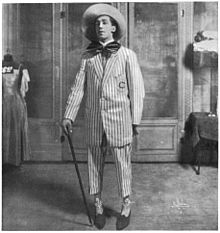Ed Wynn
Ed Wynn (born November 9, 1886 in Philadelphia , Pennsylvania , USA , † June 19, 1966 in Beverly Hills , California , USA; actually Isaiah Edwin Leopold ) was an American film and theater actor and comedian . Wynn was nominated for an Oscar for Best Supporting Actor in 1960 .
Life
Isaiah Leopold, the son of European Jewish immigrants, knew early on what he wanted to be: an actor. After graduating from Philadelphia Central High School , he ran away from home at 15 to work as an errand boy for a theater company. However, this soon went bankrupt, so that Leopold had to return home. There he earned his first living as a ladies hat seller in his father's shop.
To spare his parents the shame of his escape, he changed his name to Ed Wynn, based on his middle name Edwin , to move home to New York City five months after his return . There Wynn became a member of a vaudeville theater and was recognized for the first time. Due to his striking appearance as well as his stereotypical, mostly clumsy characters, which he embodied on stage, Wynn soon received the nickname The Perfect Fool (" The Perfect Fool ").
In 1914 he appeared for the first time in Florence Ziegfeld Jr.'s Ziegfeld Follies , a theater on Broadway , where he was initially successful. But he clashed with another Ziegfeld star, WC Fields , and provoked a media-effective feud among stars that culminated in an actor strike organized by Ed Wynn in 1919 . Shortly thereafter, Wynn was released. Wynn compensated for the boycott and the subsequent lull in theater offers when he wrote and produced plays himself in the 1920s .
Ed Wynn first appeared on the radio in 1922, and in the years that followed, he enjoyed great success as a radio comedian with programs such as Ed Wynn, the Fire Chief - one of his star roles -, Perfect fool and Ed Wynn's grab bag. In 1927 he stood in front of the film camera for the first time in rubber heels . It was now the medium of film that Ed Wynn excited. After he had taken a 16-year hiatus between 1933 and 1949, during which he returned to Broadway, he produced The Ed Wynn Show from 1949 to 1950 , a variety show show that was only moderately successful in the United States ; this was discontinued after only 38 issues. Even so, Wynn won an Emmy for Best Live Show of the Year in 1950 .
After lending the voice to the Mad Hatter in the famous Disney cartoon Alice in Wonderland in 1951 , film and television offerings followed. In the 1960s -Jahren Wynn was a familiar face in a series of mostly of Robert Stevenson staged Walt Disney productions. Above all, his portrayal of Uncle Albert , laughing on the ceiling, is unforgettable in the film musical Mary Poppins from 1964. His best-known films include his few serious roles in The Greatest Story of All Time , produced in 1965, and The Diary of Anne Frank from 1959. For the latter film, Wynn received an Oscar nomination for Best Supporting Actor in 1960 . Despite his Parkinson's disease , Wynn was in front of the camera until shortly before his death.
He was married three times. Between 1914 and 1937 he was married to Hilda Keenan. But both his marriage with her and his next partnerships with Frieda Mierse (1937-1939) and Dorothy Nesbitt (1946-1955) failed. From his marriage to Hilda Keenan son went Keenan Wynn forth, who also became an actor and with Ed Wynn for The Absent-Minded Professor ( The Absent Minded Professor, 1961) and The Pathfinder can not let it ( Son of Flubber, 1963) also together before Camera stood. In The Flying Pauker Ed Wynn was also able to play his star role as fire chief .
Ed Wynn, to whom three stars on the Walk of Fame are dedicated today, died of cancer at the age of 79 .
In 2013, Ed Wynn was posthumously awarded the Disney Legend Award.
Filmography (selection)
- 1927: Rubber Heels
- 1930: Follow the Leader
- 1933: The Chief
- 1951: Alice in Wonderland (Alice in Wonderland) (voice)
- 1958: The Love of Marjorie Morningstar (Marjorie Morningstar)
- 1959: The Diary of Anne Frank (The Diary of Anne Frank)
- 1960: Cinderella (Cinderfella)
- 1961: Riot in Toyland (Babes in Toyland)
- 1961: The Absent-Minded Professor (The Absent Minded Professor)
- 1962: The timpanist can't help it (Son of Flubber)
- 1964: Mary Poppins (Mary Poppins)
- 1965: Those Calloways (Those Calloways)
- 1965: Beloved Brigitte (Dear Brigitte)
- 1965: The Greatest Story Ever Told (The Greatest Story Ever Told)
- 1965: Everything for the cat (That Darn Cat!)
- 1967: Adventurous journey to the dwarf country (The Gnome-Mobile)
Awards
- 1 Oscar nomination: Best Supporting Actor for: The Diary of Anne Frank (The Diary of Anne Frank)
- 1 Golden Globe nomination: Best Supporting Actor for: The Great Man
- 4 Emmy nominations, including one award
- 1 Grammy : Best Child Record for: Mary Poppins
- two stars on the Walk of Fame
- Disney Legend
literature
- Keenan Wynn : Ed Wynn's Son (as told to James Brough ). Doubleday, Garden City, NY 1959, 236 pp.
Web links
- Ed Wynn in the Internet Movie Database (English)
| personal data | |
|---|---|
| SURNAME | Wynn, Ed |
| ALTERNATIVE NAMES | Leopold, Isaiah Edwin |
| BRIEF DESCRIPTION | American film and stage actor and comedian |
| DATE OF BIRTH | November 9, 1886 |
| PLACE OF BIRTH | Philadelphia , Pennsylvania , USA |
| DATE OF DEATH | June 19, 1966 |
| Place of death | Beverly Hills , California , USA |
